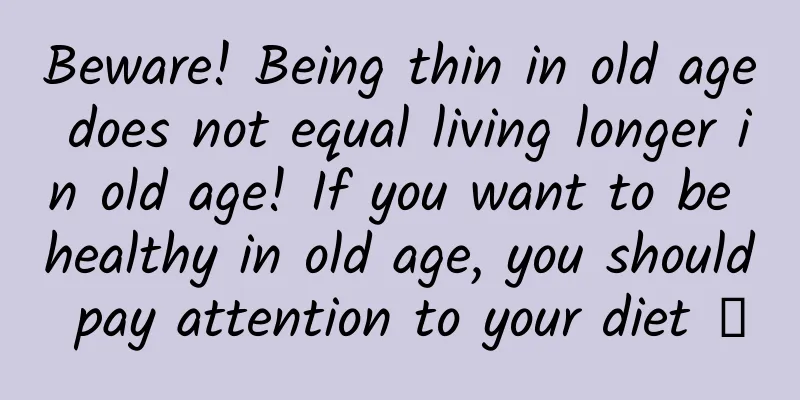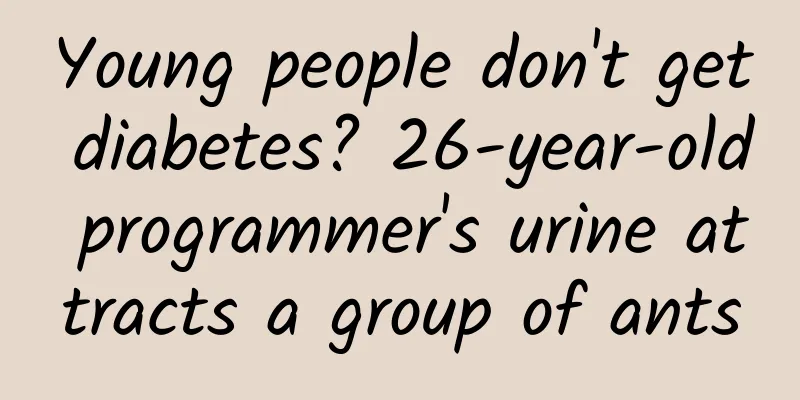Beware! Being thin in old age does not equal living longer in old age! If you want to be healthy in old age, you should pay attention to your diet →

|
It is said that money cannot buy slimness in old age. In order to achieve "slim in old age", many people will make changes to their diet. For example, they only eat vegetables and no meat, or only eat boiled food without oil smoke, or only eat half full at every meal. But in fact, sudden "slim in old age" is not a good thing at all, and cutting back on your diet for the sake of slimming in old age is not worth the loss! 01 Being thin or fat in old age is not a good thing The opposite of being thin in old age is being fat in old age. After retirement, without the pressure of work, the daily routine is eating, sleeping, watching TV, and occasionally going to the square to dance or play chess. That's a day in retirement. It's very comfortable, but also... very easy to gain weight. After the age of 60, the body's metabolism will gradually decline. After the basal metabolism decreases, people move less and less, and obesity quietly knocks on the door. Obesity is closely associated with diabetes, high blood pressure, cardiovascular and cerebrovascular diseases, and other health killers. Obviously, being fat in old age is not a good thing. Many people pursue being thin in old age because they are afraid of being fat in old age. However, being thin in old age also has considerable health risks. Except for those who have never gained weight since they were young, most elderly people need to be vigilant about being too thin in old age. Elderly people who are too thin may have sarcopenia. Sarcopenia, also known as muscle attenuation syndrome, is a syndrome in which skeletal muscle decreases, muscle strength and muscle function decline with age. Regardless of gender, age or status, when losing weight, people will face a decrease in body muscle, and muscle plays a very important role in maintaining the body's normal physiological functions. Muscle loss will cause the elderly to feel weak, and even basic standing and walking may be a problem. Not only will they walk slowly, they are also prone to falling, leading to more serious consequences. Sarcopenia can aggravate the symptoms of osteoporosis, arthritis and other diseases, making the lives of the elderly even more painful. Osteoporosis and muscle weakness are a major cause of falls in the elderly, and falls are a major risk factor for death in the elderly. Not only that, the reduction in muscle mass will also affect the normal functions of the human body. For example, processes such as blood sugar regulation and blood lipid metabolism will be affected. If things go on like this for a long time, it may induce chronic diseases such as diabetes, hypertension, and hyperlipidemia. In addition to the obvious weight loss, sarcopenia has a more hidden form - obese sarcopenia. Simply put, while muscles decrease, there is also a large increase in fat. The appearance is loose arms, fat abdomen, loose buttocks, etc. In terms of mobility, the person looks plump, but in fact, he is weak. **In short, whether it is fat or thin, it is not healthy for the elderly. **A slightly plump figure is actually the most appropriate. 02 How to judge whether you are healthy? How to judge whether you or your parents are in good health? Both weight and body shape can be monitored continuously. If your weight steadily decreases by about 5% each year without losing weight, you need to consider the occurrence of sarcopenia. At the same time, you can also use a soft tape measure to measure the maximum circumference of the calf. If it is >34 cm for men and >33 cm for women, the risk of sarcopenia is lower, otherwise you need to be vigilant. If there is no soft tape measure, you can also use the index fingers and thumbs of both hands to form a circle. If it just circles the thickest part of the calf, or the gap in the circle is still relatively large, you need to pay attention to the problem of muscle loss. In addition, we can also observe the elderly's daily life. If they walk too slowly or have difficulty standing up from a sitting position, these may also indicate a decrease in muscle mass. In the early stages of sarcopenia, the elderly will often feel tired and weak, and have no energy to do anything. 03 What is the healthiest way for the elderly to eat? In order to maintain a healthy body shape and avoid sarcopenia, special attention should be paid to diet. The elderly do not need to diet at all, because most of them do not eat enough. As people age, both their sense of taste and gastrointestinal digestive function will gradually weaken, which will make the elderly not only unwilling to eat, but also eat less and less, which has led to the widespread problem of malnutrition among the elderly. In a study in 2022, more than 40% of the elderly over 60 years old were malnourished or at risk of malnutrition. Malnutrition in the elderly can induce anemia, weakened immune function, increase the risk of disease, and is also related to the occurrence of sarcopenia. **To prevent malnutrition, sarcopenia, etc., you must eat enough high-quality food. **According to the Chinese Residents' Dietary Guidelines, it is recommended that the total daily intake of high-quality protein food for the elderly over 60 years old should reach 120-150 grams, including 40-50 grams of fish, 40-50 grams of livestock and poultry meat, 1 egg, 300-400 ml of milk or 30-36 grams of milk powder per day, and some soy products such as northern tofu, tofu shreds, tofu skin or dried tofu. This diet can ensure the protein needs of the day. Some elderly people do not eat meat for a long time or eat very little meat in order to save money or because they have no appetite. This will lead to a lack of protein and many essential amino acids in the body, as well as a lack of trace elements such as iron, zinc, and calcium. This will have a great impact on the body in the long run. Therefore, you must eat meat in moderation (not fat meat) and eat enough to stay healthy. Another thing to note is that you should not just drink the broth without eating meat. The broth does not contain much nutrients, but contains more fat, which is not good for health. If you like to drink soup, it is best to skim off the floating oil on the top, use less oil and salt, and drink the soup and eat the meat, so that the nutrients can really go into your stomach. In terms of overall dietary structure, try to ensure that you eat 12 kinds of food every day and 25 kinds of food every week, covering grains, potatoes, vegetables, fruits, beans, meat, milk, eggs, and nuts. It is recommended to choose foods with soft texture and high energy and nutrient density. In addition, the elderly also need to consider additional nutritional supplements to avoid not getting enough vitamins, minerals, etc. from their daily diet. It is especially important to note that the elderly tend to go to extremes in their use of oil and salt, either not eating them at all or eating too much. It is recommended that the elderly use 25-30g of oil per day and no more than 5g of salt per day. Those with high blood pressure need to further control their intake. Author|Li Tailuo popular science author Review|Xue Qingxin, member of Chinese Nutrition Society, registered nutritionist, health manager, public nutritionist |
>>: Danger! I almost died! Don't do this when the weather is warm!
Recommend
WeChat released a new version, there are 3 design details worth paying attention to!
WeChat recently updated its iOS version, and seve...
The Shenzhou 13 manned spacecraft is about to return home. What are the steps for astronauts to get home?
According to the China Manned Space Engineering O...
Cars.com: Tesla Model Y tops 2022 American Made Index
The American automotive website Cars.com recently...
Tesla Model X is rated the most unreliable car of the year, Toyota once again becomes the industry's quality benchmark
"Land Rover cannot be repaired, Toyota canno...
Alibaba Iron Army Sales Course Season 2: Find the first customer and earn the first million
The directory is as follows: 【Introduction】What c...
Chukong Technology officially releases "One-stop solution for game development"
On February 2, 2015, Chukong Technology officiall...
How much does it cost to join the Tongliao skin care products mini program?
How much does it cost to join a skin care product...
Read Stepdaughter novels for free, and read the complete Stepdaughter collection with a warm and smiling spring!
The latest chapter of the Stepdaughter novel TXT ...
World's first! Gene-edited pig heart transplanted into human body
The University of Maryland School of Medicine iss...
User growth has undergone a qualitative change, from AARRR to RARRA!
Today, the topic I want to share with you is the ...
The voting activity has been exposed over 730,000 times, dissecting the promotion and operation logic of the activity!
Although photo voting has been around for many ye...
Why is this little bird wearing a “black mask”?
A bird's eye view of science Quanzhou Associa...
How to buy the Kuaishou popularity agreement, or where to buy popularity?
Professional Douyin and Kuaishou likes-boosting p...
How can humans achieve "banana freedom"? First, cure the "cancer" of bananas!
1. Overview 1.1 Banana’s function and value Banan...
How to make users like watching your ads?
Today, a colleague asked me: Why should users fol...









